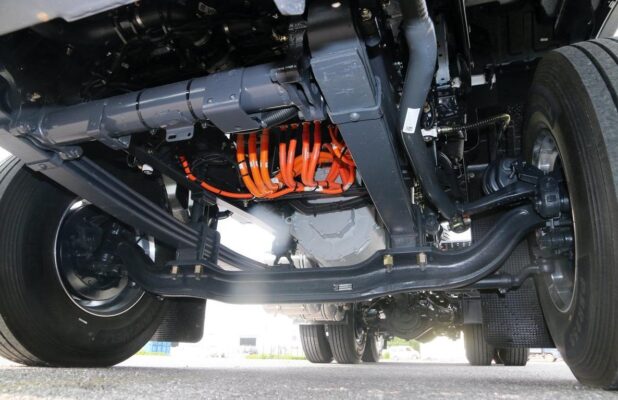Electric Truck News
Why do pure electric vehicles have good acceleration performance?
Posted on by Electric Trucks
In the modern automotive landscape, pure electric vehicles have emerged as a remarkable alternative to traditional fuel – powered vehicles, especially when it comes to acceleration performance. This superiority in acceleration can be attributed to their unique electric drive system, which sets them apart from conventional automobiles in several significant ways.
Pure electric vehicles use batteries as their energy source, and through motors, they convert electrical energy into mechanical energy to propel the vehicles forward. This fundamental difference in power generation and transmission compared to traditional fuel – powered vehicles endows electric vehicles with distinct advantages in acceleration.

What are the advantages of the power reserve of electric vehicles compared with fuel – powered vehicles?
The batteries utilized in electric vehicles are a key factor contributing to their excellent acceleration performance. These batteries are capable of providing high – power output, which is a crucial aspect of rapid acceleration. The energy density of the batteries in electric vehicles is relatively high. This high energy density means that a significant amount of energy can be stored within a relatively compact space, allowing for a more substantial power reserve.
When compared to traditional fuel – powered vehicles, the electrical energy provided by the batteries can be converted into mechanical energy more quickly. In a fuel – powered vehicle, the combustion process in the engine has multiple intermediate steps before the energy is finally translated into mechanical motion. This includes the injection of fuel, combustion within the cylinders, and the transfer of power through the drivetrain. In contrast, in an electric vehicle, the conversion from electrical energy stored in the battery to mechanical energy in the motor is a more direct process. As a result, electric vehicles can rapidly release powerful power when starting. This immediate availability of high – power output gives electric vehicles a distinct edge in terms of initial acceleration.
For example, during a quick start from a standstill, such as at a traffic light or during a drag race – like situation, an electric vehicle can draw on the high – power reserve of its battery without the need for the complex and time – consuming processes involved in a fuel – powered vehicle’s engine startup and power build – up.

What are the characteristics of the motors in electric vehicles?
The motors used in electric vehicles possess several characteristics that are highly conducive to good acceleration performance. One of the most notable features is their fast response speed. When the accelerator pedal is pressed in an electric vehicle, the motor can respond almost instantaneously. This is in contrast to the internal combustion engines in fuel – powered vehicles, which may have a certain delay in power delivery due to factors such as engine inertia and the time required for fuel – air mixture combustion.
The power output of electric vehicle motors is also continuous and stable. This stability ensures that the vehicle can maintain a consistent acceleration rate without the power fluctuations that can sometimes occur in fuel – powered vehicles. Moreover, electric vehicle motors can instantly provide the maximum torque for the vehicles. Torque is a crucial factor in acceleration, as it determines the rotational force that can be applied to the wheels. The ability of the motor to deliver maximum torque immediately means that the vehicle can accelerate rapidly from a standstill or during overtaking maneuvers.
Efficient energy conversion is another key characteristic of electric vehicle motors. They can convert electrical energy into power with high efficiency, minimizing energy losses during the conversion process. This efficient conversion allows more of the stored electrical energy in the battery to be effectively used for propulsion, thereby enhancing the vehicle’s acceleration performance.

Compared with fuel – powered vehicles, what other factors in electric vehicles are conducive to acceleration performance?
Electric vehicles are equipped with a comprehensive power control system, which is a significant advantage in terms of acceleration. This system can intelligently control the output power and rotational speed of the motors. By precisely adjusting these parameters, the vehicle can achieve optimal acceleration based on different driving conditions. For example, during a gentle acceleration for normal driving, the power control system can limit the power output to conserve energy while still providing a smooth acceleration. However, when a sudden burst of acceleration is required, such as when merging onto a highway or passing another vehicle, the system can quickly increase the power output and rotational speed of the motor to deliver rapid acceleration.
Another factor is the lower center of gravity in electric vehicles. The layout of the battery, which is typically located at the bottom of the vehicle, helps to lower the center of gravity. This has multiple benefits for acceleration performance. A lower center of gravity improves the vehicle’s handling and stability. During acceleration, a stable vehicle is less likely to experience wheel spin or loss of traction, allowing for more efficient power transfer to the road and better acceleration. Additionally, the battery layout can optimize the weight distribution of the vehicles. A well – distributed weight across the vehicle chassis ensures that the power from the motor is evenly transmitted to the wheels, further enhancing the overall acceleration performance.

Do electric vehicles have the problem of slow starting?
Pure electric vehicles adopt a direct – drive structure, which is a significant departure from the traditional drivetrain in fuel – powered vehicles. In a traditional fuel – powered vehicle, the starting process involves multiple mechanical components such as the starter motor, clutch (in manual transmissions), and the complex gear – shifting mechanism. These components introduce a certain degree of inefficiency and delay during the starting process.
In contrast, electric vehicles do not need this elaborate starting process. Their motors can instantly output torque as soon as the driver demands acceleration. There are no mechanical transmission losses such as those associated with the transmission in traditional vehicles. This absence of mechanical losses means that more of the power generated by the motor is directly transferred to the wheels, enabling electric vehicles to achieve rapid starting acceleration. For example, when an electric vehicle is at a complete stop and the driver presses the accelerator, the vehicle can immediately start moving forward with a significant amount of acceleration, without the sluggish start often associated with some fuel – powered vehicles.

Are there any other advantages of pure electric vehicles in terms of acceleration performance?
The power system of pure electric vehicles offers high – efficiency energy utilization and precise control, which not only results in excellent acceleration performance but also brings about other benefits. The high – efficiency energy utilization means that the vehicle can make the most of the stored electrical energy in the battery for acceleration and overall driving. This efficiency is not only beneficial for acceleration but also contributes to the overall range of the vehicle.
In addition to acceleration performance, pure electric vehicles offer zero – emission and low – noise driving. This makes them highly competitive in fields such as urban transportation, where environmental concerns and noise pollution are significant issues. The zero – emission aspect is particularly appealing as it helps to reduce air pollution in urban areas, while the low – noise operation provides a more pleasant driving experience for both the driver and passengers, as well as reducing noise pollution in the surrounding environment.

In conclusion, the good acceleration performance of pure electric vehicles is the result of multiple factors associated with their electric drive system. The high – power output and rapid energy conversion of batteries, the fast – response and efficient motors, the intelligent power control system, the favorable vehicle dynamics due to a lower center of gravity and optimized weight distribution, and the direct – drive structure all contribute to their rapid starting power and flexible acceleration performance. As technology continues to advance, it is expected that pure electric vehicles will further improve in these aspects and become an increasingly mainstream means of transportation in the future.
